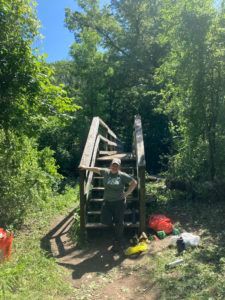On the Ground: Volunteers Kick-Off Annual Convention by Increasing Hunter Access at Rose Lake SGA

MUCC Executive Director, Amy Trotter, stands in front of the repaired access bridge after working alongside other volunteers to improve hunter access at Rose Lake SGA.
On Friday, June 24, 2022, 15 volunteers helped increase hunter and recreationist access in the central part of Rose Lake State Game Area by repairing an access bridge, removing woody vegetation from around the bridge and maintaining surrounding trails by removing trash and invasive vegetation at access sites. In total, volunteers removed invasive vegetation from about 0.5 acres of habitat and cleared about 350 meters of access trails.
After putting in work and getting their boots dirty on the ground, volunteers enjoyed lunch at the Glassen Shooting Education Center at Rose Lake Shooting Range and had plenty of time to clean-up and head over to MUCC headquarters for the annual family BBQ. At the BBQ, attendees registered for convention, enjoyed some local BBQ and reconnected with other MUCC members.
MUCC’s OTG program greatly appreciates all of the dedicated volunteers who take time to improve public lands and wildlife habitat with us. Since 2013, the OTG program has engaged over 3,650 volunteers who have helped improve about 3,380 acres of wildlife habitat on public lands throughout the state of Michigan.
You, too, can play a part in improving wildlife habitat or increasing recreationist access in your neck of the woods. The OTG program is open to the public; you do not need to be a member of MUCC to participate in our habitat improvement projects. We do everything from building brush piles, removing invasive trees, restoring grassland habitat through native wildflower plantings, installing fish spawning structures and wood duck boxes, participating in river clean-ups, and planting mast-producing trees. Visit https://mucc.org/on-the-ground/ to view upcoming projects or contact Habitat Volunteer Coordinator Kristina Kennedy at kkennedy@mucc.org with project inquiries or questions about the OTG program.
Check out a short video from the OTG project at Rose Lake SGA by clicking HERE.
Recent Posts



